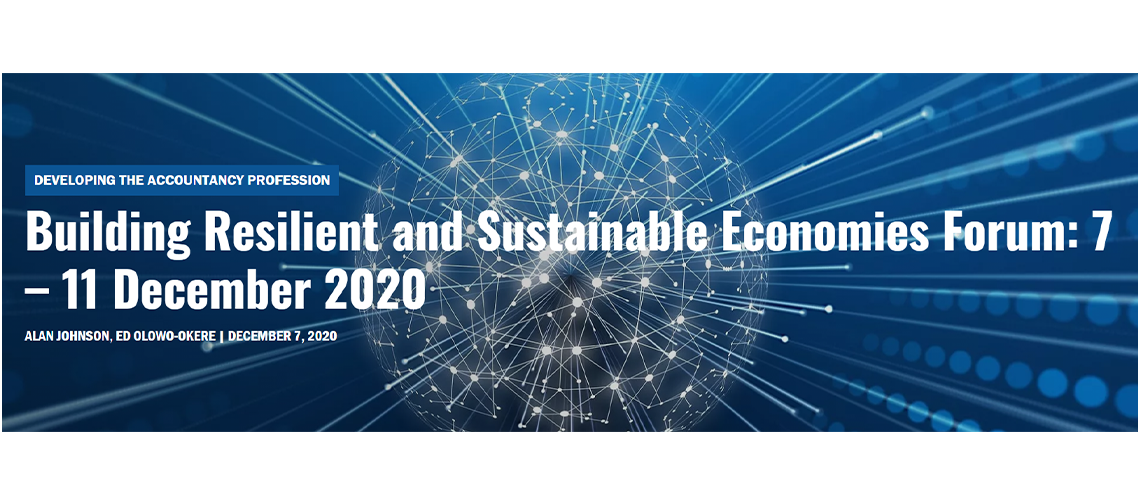 Building Resilient and Sustainable Economies Forum
Building Resilient and Sustainable Economies Forum
How do we build resilience into a global economy weakened by the COVID-19 pandemic? And how do we do so sustainably? These questions will be the focus of discussions during the MOSAIC forum – a coalition of accountancy professionals, international donors, and development experts – to be held virtually from December 7 to 11. MOSAIC, which is co-chaired by the World Bank and the International Federation of Accountants (IFAC), has invited a diverse group of experts to share their views on these questions during the forum.
Governments will, no doubt, be playing a leading role in building resilient and sustainable economies, as large investments from the public sector will be pivotal. Three areas for action, amongst others, stand out as necessary to make these investments successful.
1. Enhance public financial management
Behind every well-spent dollar in the public sector, there is a system of public financial management (PFM) that enables budget formulation, budget execution, accounting and reporting, independent assurance, and oversight. It allows for efficient allocation and use as well as accountability for public funds. It is essential for good governance and can help reduce corruption.
In the current COVID-19 context, governments are spending significant amounts on public health services. The efficiency of and accountability for this spending will depend, to a large extent, on the strength of the public financial management system. This spending may have implications well into the future. In governments, where and how money flows today will influence public spending for some years to come.
The public health emergency facing the world today will eventually pass, but emergencies—public health or otherwise—will almost certainly happen again. Strong public financial management is necessary for effective government actions during emergencies. It is also critical to managing recovery programs. Strengthening PFM systems in every country will ensure effective management of public funds, before, during, and after emergencies. Governments will need the support and services of professional accountants to reform their systems and build financial management skills in the public sector.
2. Accelerate digitalization
Countries that have not made adequate investments in digitizing the public sector struggled to ensure business continuity during the pandemic, as some measures designed to contain the virus confined people to their homes. A World Bank Group study found that only 1 in 26 jobs in low-income countries can be done remotely, compared to 1 in 5 jobs globally. Simultaneously, the COVID-19 pandemic has been a catalyst for the digital transformation of government and service provision for resilience. Strict public health measures have turned digital technologies into a part of daily life for countless people. Virtual communication, cloud computing, and cybersecurity, amongst others, have become common with the rise of remote work.
This blog was originally published
The public sector needs to build on this momentum and speed up digital transformation. Governments need to take the lead in addressing information and communication technology infrastructure barriers to transiting to digital economies. They will need the expertise of professional accountants and other experts in policymaking and finance to chart the path to digital development, including developing, financing, and implementing ICT investment programs.
3. Strengthen partnerships
MOSAIC promotes collaborative dialogue and action for capacity-building and sustainable growth. The MOSAIC Forum includes organizations with similar missions, where new or refined thoughts that emerge are shared among various networks beyond the Forum. The MOSAIC Forum multiplies the benefits of each partner’s contributions—and this has been evident in the development of the accountancy profession. A strong accountancy profession in every country is necessary to strengthen PFM systems and transition to digital economies, which are necessary to build resilience and achieve sustainability.
To predict and prepare for the future is far too large a task for one person or one organization. IFAC represents more than three million accountants and provides a global voice for the accountancy profession. The World Bank is working for sustainable solutions to reduce poverty and promote shared prosperity in developing countries around the world. IFAC and the World Bank will continue to engage in the MOSAIC Forum to support building resilient and sustainable economies.



Join the Conversation